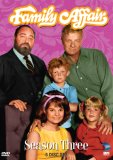| Reviews & Columns |
|
Reviews DVD TV on DVD Blu-ray 4K UHD International DVDs In Theaters Reviews by Studio Video Games Features Collector Series DVDs Easter Egg Database Interviews DVD Talk Radio Feature Articles Columns Anime Talk DVD Savant Horror DVDs The M.O.D. Squad Art House HD Talk Silent DVD
|
DVD Talk Forum |
|
|
| Resources |
|
DVD Price Search Customer Service #'s RCE Info Links |
|
Columns
|
|
|
Family Affair - Season Three
Truly one of the most critically unsung television series of the 1960s, Family Affair is a remarkably sure-footed emotional drama, masquerading as a standard "moppets and single parent" sitcom, that never received the respect it deserved. Since I watched reruns of Family Affair when I was a kid, I've always had the feeling that it was pitched specifically at my age group. After all, the focus of the show was on two young, adorable twins, and the funny adventures they had living with their grumpy bachelor uncle in glamorous New York City. But after watching Family Affair: Season Three (I hadn't seen the series in literally decades), I was astonished at its heartfelt demeanor and its economical dramatic ease.
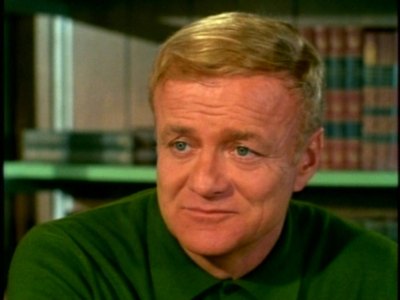
If you're not familiar with the story, it's a very simple premise. Highly successful consulting engineer Bill Davis (Brian Keith) enjoys the quintessential 1960s fantasy existence. Handsome, educated, but also "just one of the guys," unmarried Davis lives in a spectacular Manhattan high-rise apartment off Fifth Avenue. His daily cares are attended to by his English "gentleman's gentleman" Mr. French (Sebastian Cabot). His days are filled with exciting journeys to foreign countries to work on big-scale engineering projects, while his nights are concerned with dating successful, beautiful women.
The death of Bill's brother and his sister-in-law necessitates their three children coming to live with him in New York: Cissy (Kathy Garver), the eldest at 15, and just moving into that most awkward phase of a teen girl's life, and the six-year-old twins, Buffy (Anissa Jones) and Jody (Johnnie Whitaker). It's a custodial role that Bill very reluctantly takes on. Often away on business, and not wanting to alter his essentially selfish bachelor lifestyle, Bill loves the children, but their inclusion into his set life is a major adjustment that doesn't resolve itself easily. Mr. French has even more difficulty adjusting to the needs of small children who don't understand rules without affection. Although Mr. French eventually comes to love the children, too, his training and his duties often conflict with the open affection that these grieving children so obviously need.
And that's basically it for Family Affair. While plots would sometimes find the children off on some exotic adventure (such as in this season with the twins getting lost in Spain, or Cissy going off to Europe with her potential fiancé), most Family Affair episodes took place in the confines of Uncle Bill's apartment and the surrounding neighborhood, where Jody and Buffy learned sometimes difficult lessons about growing up. But while that premise sounds essentially like a typical "kiddie show," Family Affair is surprisingly adult and layered in its depiction of the trials and tribulations of being a young child.
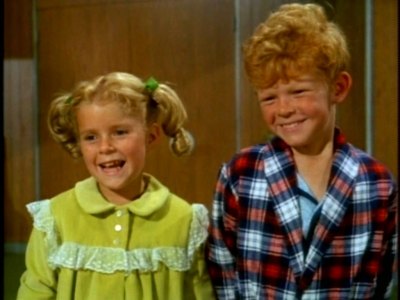
First evidence of that is the time period that Family Affair occupied during the first three of its five seasons: Monday nights at 9:30. Back in the mid-to-late 60s, most parents put their kids to bed a lot earlier than they do today, so a show time of 9:30 on a school night pretty much excluded any kiddie audience out there from watching it. But that didn't stop the adult audience from tuning in to Family Affair in droves. A monster hit in the Nielsen ratings, it came in as the fifth most watched show for this third season, proof that its primary audience - adults - were responding to its sophisticated look at an unusual family dynamic.
While naturally there are episodes this particular season that show a decidedly juvenile approach (the twins bring a giant dog home to spend the weekend - a dog that hates Bill), even that standard sitcom plot has a serious ending (knowing they deliberately lied to Uncle Bill about the dog, they realize they have to admit it to him). But this third season features several truly heartbreaking episodes. Whenever I watch vintage TV, I usually have a few of my kids express interest in watching along with me. It's a nice extra gauge to see how stuff plays today, and it helps keep the nostalgia blinders off. When they saw the DVD cover for Family Affair: Third Season, the younger ones were very excited to watch. After the rather stunning season premiere episode, all of them declined watching any more. When I asked why, they said it was too sad. Wow. Kids who are supposedly being desensitized by the crap they put out today, were depressed by this supposedly innocuous, fluffy little "nothing."
The Latch Key Kid (the season opener) details how little Buffy becomes attached to her new school friend Lana. Lana, a "latch key kid" (perhaps a first on TV?), invites Buffy over to have dinner at her house. After Mr. French investigates the neighborhood and Lana's home (both of which he disapproves), Uncle Bill gives the go-ahead and says it's okay to let Buffy have dinner there (at the beginning of the episode, Buffy felt that Uncle Bill said no to her too much). What Bill and Mr. French don't know is that Lana's mother only briefly breezes in (she has a date that's more important than watching her child), and leaves the two young children alone in the bare, depressing little apartment, instructing Lana to be careful when she cooks dinner on the stove that evening. After a "no-rules" evening of going out alone to the market, playing dress-up, and TV watching (with no homework done), Bill arrives to pick up Buffy. Surprised to see them alone, Bill doesn't blow up, but instead invites Lana over the next day to spend the night at the apartment. There, she sees all the "rules" that go along with loving adults who care about what happens to their children.
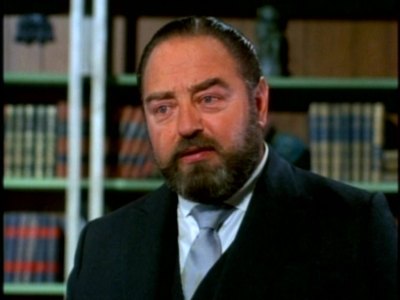
There's no happy resolution to The Latch Key Kid. Lana isn't adopted by Uncle Bill; her mother isn't given a stern talking to, whereby she sees the errors of her ways. Nothing is solved. And in fact, Buffy, seeing how desperately unhappy Lana truly is, rejects Lana's influence; she stays her friend, but Buffy already understands that rules for children are necessary. There are so many unexpected elements to this episode that go against the usual sitcom grain, that it was rather startling to watch. First, the screenwriter Peggy Dick, and veteran director Charles Barton, aren't afraid in the slightest to show that they disapprove of such a mother (see how often you catch such a moral tone on today's permissive TV landscape). No one lectures her; in fact, she never meets Uncle Bill or Mr. French. But after watching poor, pathetic Lana, it's clear her mother is a neglectful, selfish person who's seriously damaged this child - and the producers of that silly little comedy Family Affair are going to show you the effects. Bill's reaction when he comes to collect Buffy is also quite unusual; he doesn't freak out, as I suspect most parents would with the knowledge that two seven-year-olds were left alone in an apartment for hours, and who then went out to the store, and then used the stove to fry up some pork chops. He's concerned, but he handles it well. Bill's also quite tender, and observant, when he sees the still-skeptical Lana aching to be tucked into bed, just like Buffy. There are many such moments in Family Affair: Season Three, including an episode where Jody must come to terms with the loss of his mother, and where Buffy must reconcile her feelings of grief when a friend of hers is diagnosed with a terminal disease. For a disposable "sitcom" dismissed by the media at the time, and largely forgotten by serious critics today, Family Affair certainly has more going on thematically than fans may remember.
Director Barton, a veteran Hollywood comedy director who worked frequently on Family Affair, utilizes some rather remarkable insert shots of the actors here, including some heartbreaking shots of little Lana watching Uncle Bill kissing Buffy, while trying to understand what she's missing. It's a primitive TV technique (master shot, two shot, over-the-shoulder, close-up), but that use of the classical Hollywood style yields some amazing results in the individual performances. Keith, who had been a big movie star before moving over to television with this huge hit, is a most unusual TV "dad." His character, Uncle Bill, loves the children obviously, but it's a strain on him as well, to be essentially saddled with these kids he neither wanted nor asked for. And that tension always seems to be lying underneath Keith's performance. There's something about Keith that's so real here that you can easily forget that he's really quite a skilled, accomplished actor with a big range (check out films such as The Parent Trap to Reflections in a Golden Eye to get a sense of what he can do). In a visual schematic where silent reaction shots make up a big part of your performance (and where many were shot all at once to accommodate Keith, who was on-set for only two months out of the year), you have to be able to convey thoughts and emotions with just your face and eyes, and Keith does this beautifully, really connecting with the audience.
The child actors are quite literally flawless. Whitaker, a pro who would go on to appear in many more shows and features, is simply adorable. With his serious little face and huge shock of hair, he's an exceptionally ingratiating actor. Jones, a charmingly grave little actor whose distinctive voice sounded much older than her years, took a lot of flack for walking around with her doll, Mrs. Beasley, but watch her in two-shots with Keith and Cabot: she's really listening to them, not just waiting to (badly) deliver her next rimshot one-liner (like those famous little twins on that other big sitcom). And Garver, maturing here in her third season, is a disarming, appealing young performer in the series' toughest role. With so much of the series divided between star Keith and the magnetic twins, Garver had a job keeping the audience's attention, which she does quite nicely. Not actorly in any way, she comes across exactly the way she should: as a natural, young teenager. It's too bad we didn't see her in more roles after Family Affair ended.
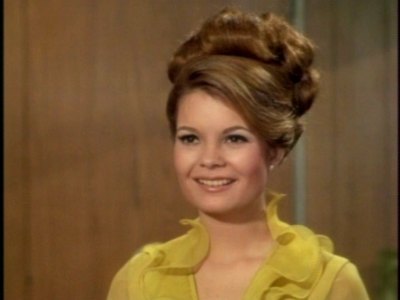
The DVD:
The Video:
Although I love the fact that Family Affair: Season Three is out on DVD, I can't say I'm terribly impressed with the transfer job that MPI did here. The full-frame video image is soft, with compression problems that are going to further weaken the picture on a large monitor. A quality show like Family Affair: Season Three deserves a better transfer than this.
The Audio:
The Dolby Digital English 2.0 mono soundtrack accurately reflects the original TV presentation.
The Extras:
There's a marvelous thirty minute featurette on disc five, Family Affair Cast and Crew Reunion Show, that gathers together Kathy Garver, producer John Stephens, Sherry Alberoni (who played Sharon, Cissy's upstairs friend), and Austin and Irma Kalish, who were regular writers and story editors for the series' run. From the interesting anecdotes told here, it sounds like Family Affair was a fun production for all involved.
Final Thoughts:
A quality 1960s drama was hiding out under the guise of a "kiddie sitcom" in Family Affair: Season Three. Beautifully drawn characterizations by seasoned pros and intuitive child actors, classically constructed screenplays that actually have a beginning, middle and end, and sensitive, economical direction made Family Affair: Season Three a total winner. If you only remember this for Mrs. Beasley, I strongly suggest you check it out again; you'll find it a heartwarming, layered, emotional experience. I highly recommend Family Affair: Season Three.
Paul Mavis is an internationally published film and television historian, a member of the Online Film Critics Society, and the author of The Espionage Filmography.


|
| Popular Reviews |
| Sponsored Links |
|
|
| Sponsored Links |
|
|
| Release List | Reviews | Shop | Newsletter | Forum | DVD Giveaways | Blu-Ray | Advertise |
|
Copyright 2024 DVDTalk.com All Rights Reserved. Legal Info, Privacy Policy, Terms of Use,
Manage Preferences,
Your Privacy Choices | |||||||









